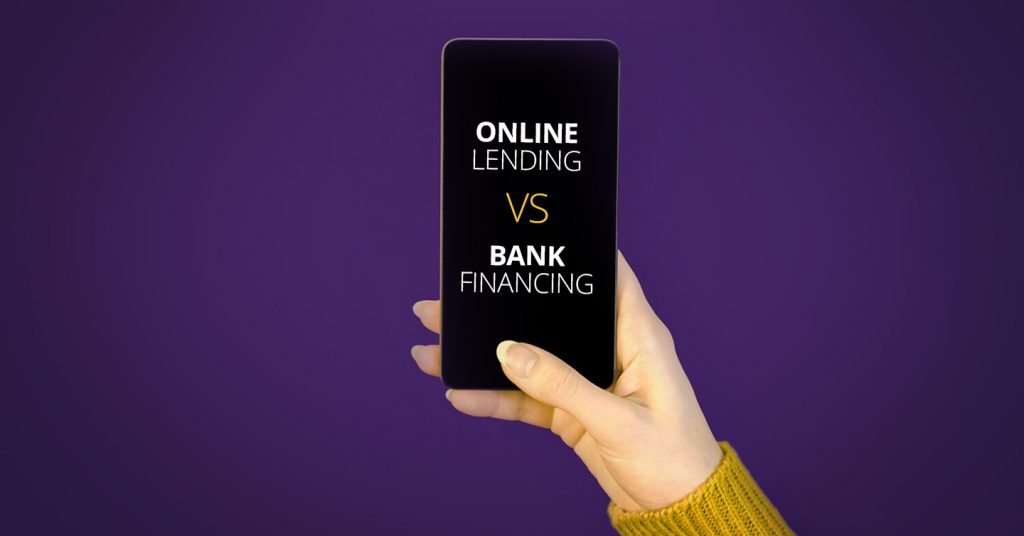
Types of Alternative Business Loans for Small Businesses
In this age of digital connectivity, advanced technology and online networks have had an increasingly profound impact on all areas of our lives.
Innovations have affected the world of finance to the point where small business owners have been exposed to the notion of alternative lending. This new idea has raised several important questions, such as:
- What are alternative business loans?
- What are the different types of alternative business funding?
- How do you qualify for alternative business loans?
We dig into those questions, and more, to help you understand what alternative lending is and how it can open up new opportunities that traditional bank loans cannot. Keep reading to find out more…
What are alternative business loans?
When people use the term ‘alternative business loans’ what they are referring to are forms of business financing that act as alternatives to traditional bank loans. As financial technology has continued to grow and evolve over recent years, alternative business loans have become a more popular and more attractive option for business owners.
One of the greatest advantages offered by alternative lending (more specifically, peer-to-peer lending) is the ‘reverse auction’ model, where lenders actually compete with one another to provide the most attractive terms to business owners applying for alternative business funding. Aside from resulting in better loan options for business owners, the reverse auction model also results in alternative loans having higher approval rates than traditional bank loans.
Alternative business loans are useful funding solutions not only for the 82% of small businesses that are unable to secure funding from their bank, but also (and perhaps even more so) for business owners looking for fast access to funding. There is a wide variety of different ‘alternative business loans’, as well as several reasons why business owners should consider them…
How do alternative business loans differ from traditional bank loans?
As the name suggests, traditional bank loans are a form of business financing that banks offer to business owners who want (or need) additional funding. Traditional bank loans can be obtained from either smaller local community banks or larger banks that have a more widespread presence. Alternative business loans, on the other hand, are accessible through private lenders, online lenders, and online business lending marketplaces like Become.
The qualifications to get approved for business financing through a traditional bank loan are quite demanding. Aside from the basic factors that most lenders consider (business age, monthly revenue, credit score, etc.), traditional bank loans will often require an explanation of what you intend on using the funds for before you’re able to be approved. As if the application process isn’t stressful enough, you’ll have to impress the bank with your idea in order to qualify!
Alternative business loans can be obtain are much more easily accessed. Not only can you apply from the comfort of your PC or smartphone, but the qualifications are also much more accomodating to small business owners who have had a tough time getting funded. You can get approved for some alternative business loans by providing just a few months’ worth of bank statements and having a solid credit score!
The fact of the matter is that 82% of business loan applicants were denied by their bank. Since the requirements for traditional bank loans are difficult for small business owners to meet, a more modern form of business funding has evolved to make the process easier: alternative business finance. You may be surprised, but the approval rates for alternative business loans are the exact opposite – 82% of loan applications with online lenders are approved. Not bad!
Types of alternative business funding
The different varieties of alternative business loans offer business owners the advantage of choosing the option that best fits their needs. We’ve filtered through the types of alternative business loans to provide you a refined list of the best options.
Top 6 types of alternative business loans:
- Business line of credit
- Unsecured business loan
- Invoice factoring
- Equipment financing
- SBA loan
- MCA

1. Business line of credit
Out of all the different types of alternative business loans, the convenience of a business line of credit is one of the hardest to match! Business owners can use them as-needed (much like a credit card), withdrawing only the amount they choose, repaying that amount, and in most cases being able to do that repeatedly (known as a revolving line of credit).
Qualifications & features
- Minimum time to funding: 24 hours
- At least 3 months in business
- Interest rates from 1%
- Repayment schedule: weekly
- Minimum FICO score: 450
See if I Qualify – Line of Credit
2. Unsecured business loan
For business owners who don’t have (or prefer not to provide) valuable assets to use as collateral, unsecured business loans act as one of the top types of alternative business loans. These collateral-free business loans put the borrower under less stress since the lender is taking on most of the risk.
Qualifications & features
- Minimum time to funding: 3 hours
- No collateral needed
- Interest rates from 7.5%
- Repayment schedule: daily or weekly
- Minimum FICO score: 350
See if I Qualify – Unsecured Loan
3. Invoice factoring
Whether it covers 100% or just a portion of the funds that your customers owe you, invoice factoring is an extremely helpful type of alternative business loan that can relieve the mounting pressure created by non-paying customers. The bottom line, though, is that you’ll want to develop methods of dealing with unpaid invoices.
Qualifications & features
- Minimum time to funding: 3 hours
- Funds replenish as you pay
- Interest rates from 4.8%
- Repayment schedule: weekly or monthly
- Minimum FICO score: 600
See if I Qualify – Invoice Factoring
4. Equipment financing
You may want to buy a new oven for your restaurant or need to finance a cement-mixer for your construction company. Regardless of what you need (or want) it for, equipment financing can help you cover the costs of acquiring a machine or tool that will help you improve your business.
Qualifications & features
- Minimum time to funding: 24 hours
- Can still qualify with poor credit
- Interest rates from 12%
- Repayment schedule: daily, weekly, or bi-weekly
- Minimum FICO score: 450
See if I Qualify – Equipment Financing
5. SBA loan
The U.S. Small Business Administration (SBA) was formed in 1953 with the mission being “to aid, counsel, assist and protect the interests of small business concerns”. As one of the most popular types of alternative business loans, it may come as a surprise that SBA loans don’t actually provide the funds. Instead, the SBA guarantees up to 85% of the loan amount so that the lender faces less of a risk if repayment is not made and the borrower feels more confident in taking a loan.
Qualifications & features
- Minimum time to funding: 14 days*
- Ideally 2 years in business or more
- Interest rates from 6.5%
- Repayment schedule: daily, weekly, bi-weekly, or monthly
- Minimum FICO score: 500
6. Merchant cash advance
A merchant cash advance (MCA) is a very unique type of alternative business loan specifically because of the way in which the repayment is made. A percentage of your business’s future credit and debit card transactions (payments received from customers) is automatically directed to paying off the funds that had been loaned to you. Usually, an MCA is treated as a last-case scenario because the interest rates are higher than other types of alternative business loans.
Qualifications & features
- Minimum time to funding: 4 hours
- At least 3 months in business
- Interest rates from 10%
- Repayment schedule: daily or weekly
- Minimum FICO score: 500
Alternative business funding vs traditional bank loans: Pros & cons
Alternative business financing
Pros
- Poor credit scores can still qualify
- Faster access to funding
- Easier application process
Cons
- Slightly higher interest rates
- Less human interaction
Traditional bank loans
Pros
- Slightly lower interest rates
- One-on-one realtionship with a banker
Cons
- Stricter requirements to qualify
- Weeks or even months to receive funds
- Lots of paperwork to complete
Qualifying for alternative business funding
If you’re concerned that you may not be able to qualify for alternative business financing, fear not! Become has a network of dozens of the top loan providers across the United States and Australia. And with such an extensive array of different types of alternative business loans, the chances that you’ll be able to get approved are that much higher.
Of course, the type of business will affect the kind of industry loans a business needs, as well as the specific circumstances that business finds itself in. Be sure to weigh your options carefully in order to choose the right funding solution for your business.
Ultimately, the ability to get approved for alternative business loans will depend on several factors, including credit scores, business age, monthly revenue, existing debt, and many more. Even with better funding odds, there’s no guarantee that any given business will be able to qualify for alternative business funding the first time they apply. But we have a solution for that, too!
Become provides applicants with a tailored LendingScore™ dashboard where business owners are given guidance on how to improve their individual funding factors. With the help and direction that Become gives (at absolutely no cost), businesses are able to effectively increase their access to more and better loan options. Plus, the online application process through Become isn’t only super quick, but it’s also simplified so that each step is intuitive and easy to understand.
How to apply for alternative business funding
Step-by-step guide for applying for fast business funding:
- Choose your desired loan amount and select ‘Get Loan Offer’
- Fill in the requested information (including time in the industry, revenue, business, etc.)
- Submit your business’s checking account information for analysis
- Wait for offers. You can also review your status by clicking ‘Access Your Loan Application’
- Review offers and select your preferred lender
- Receive the funds to your business checking account
- Review your tailored LendingScore™ dashboard to improve your funding options
- Improve your rates – if your LendingScore™ is insufficient, follow the personalized plan (8-12 weeks to unlock funding)
Final thoughts
Here’s a quick refresher on why alternative business loans should be considered as a first choice, and not just an ‘alternative’:
- Online loans are faster
- Poor credit scores can still qualify for alternative business financing
- Alternative lending offers simpler application processes
The world of business lending has evolved as technology has developed and extended its impact to the financial sector. Those advancements are bound to continue, and with them, the influence of alternative lending will continue to grow and change the way that businesses get funded. Don’t be left behind!
We hope you find the information provided in this article useful. Please feel free to share it on social media and with anyone who may find it helpful.





